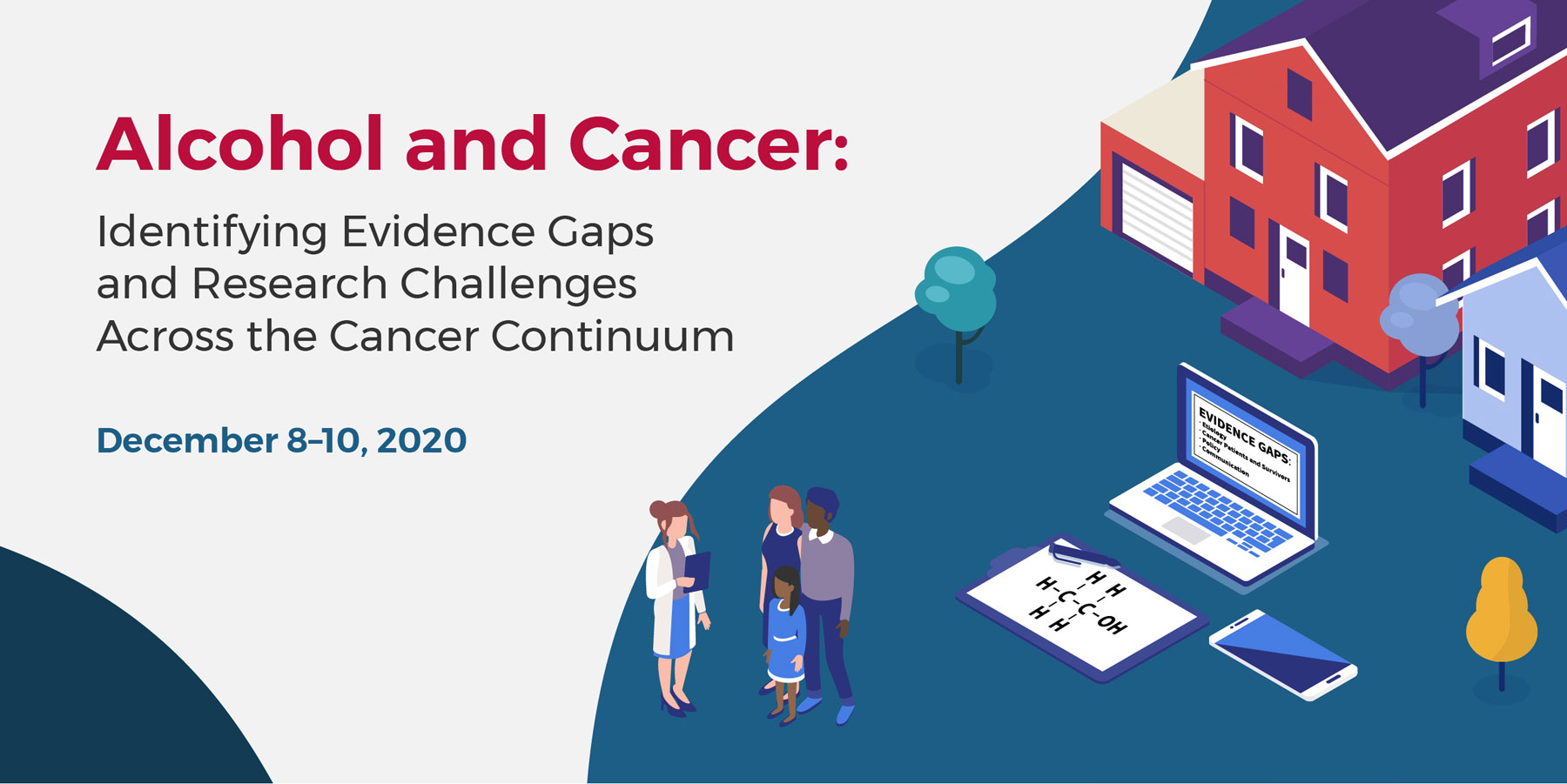Alcohol is a well-established human carcinogen, and consumption is associated with increased cancer risk and cancer recurrence. It is estimated that 5.5% of new cancer diagnoses and 5.8% of cancer deaths worldwide are attributable to alcohol consumption (1). Recent estimates for the United States indicate 5.6% of cancer cases and 4.0% of cancer deaths are attributable to alcohol consumption (2). Alcohol use can also have detrimental effects on cancer treatment, leading to prolonged recovery, increased surgical procedures, and higher health-care costs (3, 4, 5, 6).
The NCI Alcohol and Cancer Risk Fact Sheet provides a broad overview of alcohol as a risk factor for cancer, and three recent papers explore Division interest in alcohol awareness (7,8) and research needs related to alcohol and cancer prevention and control (9). A 2020 NCI workshop further highlights research gaps related to alcohol and cancer.
Overall, alcohol is classified as a Group 1 carcinogen by the International Agency for Research on Cancer (IARC) (10). IARC group 1 carcinogens are exposures and substances where the scientific evidence provides sufficient evidence of carcinogenicity. Evidence for both positive and negative associations between alcohol consumption and cancer types has been summarized by the American Institute for Cancer Research and several peer reviewed articles:
Cancer sites with sufficient evidence of an increased risk associated with alcohol intake (11)
- Oral cavity
- Pharynx
- Larynx
- Colon/rectum
- Esophagus (specifically squamous cell carcinoma)
- Hepatocellular carcinoma
- Stomach
- Female breast
Cancer sites with some evidence for an increased risk associated with alcohol intake (11, 12, 13)
- Gallbladder
- Lung
- Pancreatic
- Prostate
- Skin cancer
Cancer sites with some evidence of a decreased risk associated with alcohol intake (11, 14, 13)
- Renal cell carcinoma
- Non-Hodgkin lymphoma
Renewed global attention to cancer risk associated with alcohol intake and a 2018 statement from the American Society of Clinical Oncology support efforts to place alcohol more squarely into the cancer control research agenda (16). Moderating (or decreasing) alcohol intake is also a logical target for multi-behavioral interventions focusing on other health behavioral risk factors such as tobacco cessation. Despite the International Agency for Research on Cancer and the Department of Health and Human Services listing alcohol as a known carcinogen, public and provider awareness remains low (17, 16). Significant research gaps across the cancer control continuum remain, especially concerning how best to increase awareness and limit alcohol exposure.
Communication and awareness related to alcohol and cancer is relatively sparse
- Examine communicating uncertainty and complexity in relation to alcohol, cancer, and health outcomes at multiple levels.
- Understand and improve patient-provider communication, including identification of barriers, regarding alcohol and cancer (in both primary and specialty care).
- Understand decision-making processes regarding alcohol consumption by patients and caregivers before and along the cancer care continuum.
- Evaluate effects of warning labels in relation to alcohol and cancer prevention.
Intervention development to limit or reduce alcohol consumption for cancer prevention and control and outcomes research are in their formative stages
- Examine alcohol use post-diagnosis in relation to cancer treatment, prognosis, recurrence, and second primary tumors to identify targets for interventions.
- Examine alcohol’s effects on cancer comorbidities, quality of life, mortality and alcohol’s effects and synergy with other behavioral risk factors, such as tobacco and/or cannabis use, e-cigarette use to improve intervention efforts.
- Test innovative approaches to the dissemination and implementation of proven alcohol cessation interventions in various cancer survivor populations and settings.
Natural experiments concerning programs and policies related to alcohol and cancer need further evaluation
- Evaluate WHO’s “best buys” and other approaches to reducing harm related to cancer.
- Evaluate and model effects of alcohol related guidelines on the cancer burden.
Measurement methods for alcohol use for evaluation of interventions and guideline approaches to alcohol and cancer are not complete
- Develop and improve measures of alcohol related behaviors and attitudes as they relate to cancer over the life course.
- Improve methods to assess drinking history (e.g., binge drinking and periods of abstinence) in various populations (e.g., adolescents, survivors, people with history of alcohol dependence/abuse).
Despite the clear evidence for alcohol carcinogenicity, further understanding of mechanisms linking alcohol and cancer are needed to better develop and target appropriate interventions
- Increase understanding of mechanisms linking alcohol consumption, cancer treatment effectiveness and risk of recurrence or second cancers to identify targets for intervention development.
- Examine differences in alcohol consumption patterns and their relationship to cancer with explicit attention to improving cancer control via alcohol and addressing alcohol and cancer related differences.
- Improve estimates of dose-response relationships between light and moderate alcohol consumption and cancer.
- Examine interactions between alcohol consumption and energy balance as it relates to cancer prevention and control to identify targets for intervention development.
- Evaluate the epigenetic effects of alcohol over the life course and cancer risk.
- Examine effects of light and moderate alcohol consumption on aging trajectories and diagnosis and treatment of cancer in the elderly to identify strategies to limit alcohol exposure.
Alcohol use is not independent of other risk factors, therefore research projects addressing alcohol as a target for cancer prevention and control should consider a multi-behavioral framework along with multilevel influences on alcohol use. Where appropriate, investigators should consider co-occurrence of alcohol use with other cancer-related behavioral risk factors (e.g., tobacco use, sun exposure, physical activity, sleep disturbances) when designing interventions. Research gaps also exist in understanding additive, synergistic or antagonistic effects of alcohol use in cancer prevention and control.
On This Page
News and Highlights
Funding Opportunities
| Title | Announcement # | Expiration Date | Contact |
|---|---|---|---|
|
Population Approaches to Reducing Alcohol-related Cancer Risk |
PAR-25-221 | January 08, 2027 |
David Berrigan
|
| Modular R01s in Cancer Control and Population Sciences | PA-25-172 (R01 Clinical Trial Optional) | January 08, 2028 | Scott Rogers 240-276-6932 rogerssc@mail.nih.gov |
| NIH Research Project Grant | PA-25-301 (Parent R01 Clinical Trial Not Allowed) | January 08, 2028 | Go to https://www.cancer.gov/about-nci/organization to explore NCI divisions and identify program contacts by interest. |
| Dissemination and Implementation Research in Health | PAR-25-144 (R01 Clinical Trial Optional) PAR-25-143 (R21 Clinical Trial Optional) PAR-25-233 (R03 Clinical Trial Not Allowed) |
January 08, 2028 | Gila Neta 240-276-6785 gila.neta@nih.gov |
|
Exploratory Grants in Cancer Control |
PA-25-253 (R21 Clinical Trial Optional) | September 08, 2028 |
Mukesh Verma |
Meetings and Events
Alcohol and cancer: Identifying evidence gaps and research challenges across the cancer continuum

This workshop brought together basic, epidemiologic, behavioral, translational, clinical, regulatory, and communication scientists to discuss evidence gaps related to the role of alcohol across the cancer continuum.
- Alcohol Tied to 750,000 Cancer Cases Worldwide in 2020. NCI Staff. Cancer Currents blog, National Cancer Institute. 2021.
- Alcohol as a Target for Cancer Prevention and Control: Research Challenges, NCI webinar, December 18, 2020.
- “Alcohol and Cancer in the United States,”
 NCI webinar with Dr. Noelle LoConte, lead author of the ASCO statement
NCI webinar with Dr. Noelle LoConte, lead author of the ASCO statement - Health Information National Trends Survey (HINTS)
- Alcohol and Cancer Risk Fact Sheet, National Cancer Institute
- Clinician Role in Patient Awareness Regarding Carcinogenic Nature of Alcohol Consumption in the US: a Nationally Representative Survey
 Wiseman KP, Seidenberg AB, Klein WMP. J Gen Intern Med. September 10, 2021.
Wiseman KP, Seidenberg AB, Klein WMP. J Gen Intern Med. September 10, 2021. - NIAAA Alcohol Policy Information System (APIS)
Contacts




